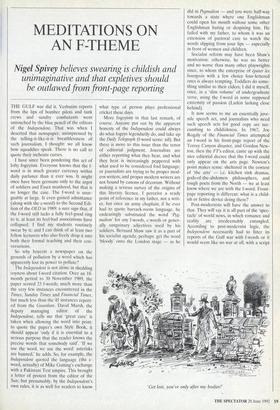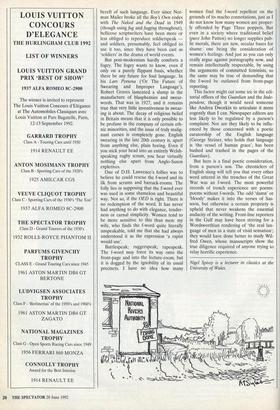MEDITATIONS ON AN F-THEME
Nigel Spivey believes swearing is childish and
unimaginative and that expletives should be outlawed from front-page reporting
THE GULF war did it. Verbatim reports from the lips of bomber pilots and tank crews and sundry combatants went untouched by the blue pencil of the editors of the Independent. That was when I deserted that newspaper, unimpressed by the telling-it-like-it-is breathlessness of such journalism. I thought: we all know how squaddies speak. There is no call to quote their inchoate curses.
I have since been pondering this act of lofty fogeyism. Everyone knows that the f- word is in much greater currency within daily parlance than it ever was. It might once have been germane only to the argot of soldiers and Essex manhood, but that is no longer the case. The f-word is unar- guably at large. It even gained admittance (along with the c-word) to the Second Edi- tion of the OED in 1989: a sure sign that, if the f-word still lacks a fully feel-good ring to it, at least its feel-bad associations have collapsed. I find my students routinely swear by it; and I can think of at least two fellow lecturers who also freely drop it into both their formal teaching and their con- versations.
So why boycott a newspaper on the grounds of pollution by a word which has apparently lost its power to pollute?
The Independent is not alone in shedding coyness about f-word citation. Over an 18- month period to 30 November 1989, the paper scored 23 f-words; much more than the very few instances encountered in the Times, Sunday Times and Financial Times, but much less than the 45 instances report- ed from the Guardian. David Marsh, the deputy managing editor of the Independent, tells me that 'great care' is taken when allowing the word into print: to quote the paper's own Style Book, it should appear 'only if it is essential to a serious purpose that the reader knows the precise words that somebody said'. 'If we use the word, we use the word: asterisks are banned,' he adds. So, for example, the Independent quoted the language (the c- word, actually) of Mike Gatting's exchange with a Pakistani Test umpire. This brought a letter of protest from the editor of the Sun; but presumably, by the Independent's own rules, it is as well for readers to know
what type of person plays professional cricket these days.
More fogeyism in that last remark, of course. Anyone put out by the apparent honesty of the Independent could always do what fogeys legendarily do, and take up the Daily Telegraph (f-word score: nil). But there is more to this issue than the tenor of editorial judgment. Journalists are either reporting what they hear, and what they hear is increasingly peppered with what used to be considered foul language; or journalists are trying to be proper mod- ern writers, and proper modern writers are not bound by canons of decorum. Without making a serious survey of the origins of this literary licence, I perceive a ready point of reference in my father, not a writ- er, but once an army chaplain; if he ever had to quote barrack-room language, he endearingly substituted the word 'Pyg- malion' for any f-words, c-words or gener- ally sanguinary adjectives used by his soldiers. Bernard Shaw saw it as a part of his socialist agenda, perhaps: get the word 'bloody' onto the London stage — as he did in Pygmalion — and you were half-way towards a state where one Englishman could open his mouth without some other Englishman hating or despising him. He failed with my father, to whom it was an extension of pastoral care to watch the words slipping from your lips — especially in front of women and children.
Socialist reform may have been Shaw's motivation: otherwise, he was no better and no worse than many other playwrights since, to whom the enterprise of epater les bourgeois with a few choice four-lettered ones is always tempting. Toddlers do some- thing similar to their elders; I did it myself, once, in a 'slim volume' of undergraduate verse, using the f-word in some supposed extremity of passion (Larkin lurking close behind).
It now seems to me an essentially juve- nile speech act, and journalists who need such speech acts for good copy are suc- cumbing to childishness. In 1967, Joe Rogaly of the Financial Times attempted an f-word in his front-page report of the Torrey Canyon disaster, and Gordon New- ton, then the FT's editor, came up with the nice editorial decree that the f-word could only appear on the arts page. Newton's point makes sense: sheltered in the context of 'the. arts' — i.e. kitchen sink dramas, gods-of-the-abdomen philosophers, and tough poets from the North — we at least know where we are with the f-word. Front- page reporting is different: what is a child- ish or fictive device doing there?
Post-modernists will have the answer to that. They will say it is all part of the 'spec- tacle' of world news, in which romance and reality are irredeemably entangled. According to post-modernist logic, the Independent necessarily had to litter its reports of the Gulf war with f-words or it would seem like no war at all, with a script
'Get lost, you've only after my bodies!' bereft of such language. Ever since Nor- man Mailer broke all the Boy's Own codes with The Naked and the Dead in 1949 (though using fug and fugging throughout), bellicose scriptwriters have been more or less obliged to reproduce soldierspeak — and soldiers, presumably, feel obliged to use it too, since they have been cast as 'soldiers' in the drama of world events.
But post-modernism hardly comforts a fogey. The fogey wants to know, even if only on a purely flippant basis, whether there be any future for foul language. In his Lars Porsena ('Or The Future of Swearing and Improper Language'), Robert Graves lamented a slump in the manufacture of blasphemies and swear- words. That was in 1927, and it remains true that very little inventiveness in swear- ing is about. The decay of religious belief in Britain means that it is only possible to be profane in the company of certain eth- nic minorities, and the issue of truly malig- nant curses is completely gone. English swearing in the late 20th century is, apart from anything else, plain boring. Even if you stick your head into an entirely Welsh- speaking rugby scrum, you hear virtually nothing else apart from Anglo-Saxon expletives.
One of D.H. Lawrence's follies was to believe he could rescue the f-word and its ilk from scrums and barrack-rooms. The folly lies in supposing that the f-word ever was used in some shameless and beautiful way. Not so, if the OED is right. There is no redemption of the word. It has never had anything to do with elegance, tender- ness or carnal simplicity. Women tend to be more sensitive to this than men: my wife, who finds the f-word quite literally unspeakable, told me that she had always understood it as the expression 'a rapist would use'.
Battlespeak; ruggerspeak; rapespeak. The f-word may force its way onto the front-page and into the lecture-room, but it is dogged by the ignobility of its usual precincts. I have no idea how many women find the f-word repellent on the grounds of its macho connotations, just as I do not know how many women are proper- ly offended by Page Three poppets. But even in a society where traditional belief (pace John Patten) no longer supplies pub- lic morals, there are new, secular bases for shame: one being the consideration of women's feelings. And just as you can only really argue against pornography now, and remain intellectually respectable, by using the arguments of committed feminists, so the same may be true of demanding that the f-word be outlawed from front-page reporting.
This factor might cut some ice in the edi- torial offices of the Guardian and the Inde- pendent, though it would need someone like Andrea Dworkin to articulate it more cogently than I can. Newspaper editors are less likely to be regulated by a parson's complaint. Nor are they likely to be influ- enced by those concerned with a poetic curatorship of the English language (George Steiner, who holds that language is 'the vessel of human grace', has been bashed and trashed in the pages of the Guardian).
But here is a final poetic consideration, from a parson's son. The chroniclers of English slang will tell you that every other word uttered in the trenches of the Great War was an f-word. The most powerful records of trench experience are poems: poems without f-words. The odd 'damn' or 'bloody' makes it into the verses of Sas- soon, but otherwise a certain propriety is upheld that never weakens the essential audacity of the writing. Front-line reporters in the Gulf may have been striving for a Wordsworthian rendering of 'the real lan- guage of men in a state of vivid sensation'; they would have done better to study Wil- fred Owen, whose manuscripts show the true diligence required of anyone trying to relay horrific experience.
Nigel Spivey is a lecturer in classics at the University of Wales.



























































 Previous page
Previous page